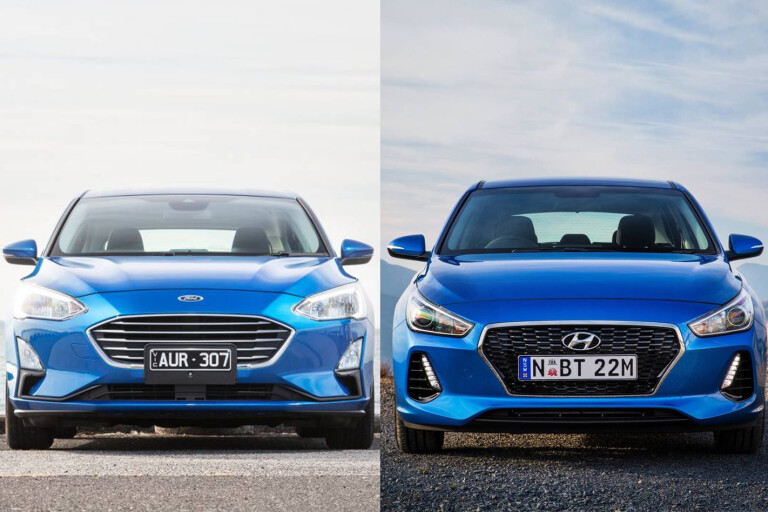
The fourth-generation Ford Focus arrived at the end of 2018 and it’s already evident that its closest rival is the Hyundai i30 which goes toe to toe with the Ford’s euro hatch in terms of space, comfor and performance.
We’ve brought together the entry-level Ford Focus Trend and the similarly equipped Hyundai i30 Active auto.
HOW AFFORDABLE ARE THEY?
Ford Focus Trend
Priced at $25,990 the Ford Focus Trend hatchback is the cheapest Focus in the range.
Our test car featured Desert Island Blue premium paint valued at $650, which took the retail price to $26,640, which is what you’d pay for other similarly-equipped mid-spec hatches, such as the Holden Astra RS ($27,240) and the Toyota Corolla SX ($26,670).
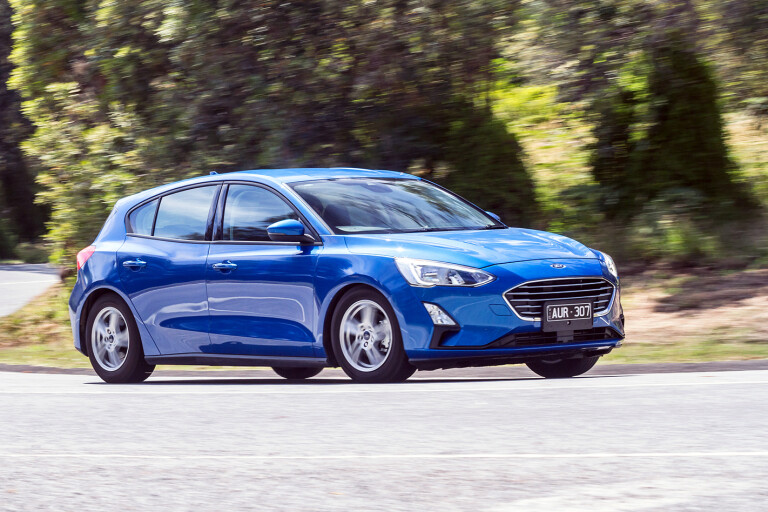
The Focus Trend’s official fuel consumption is 6.4L/100km combined, with our testing taking that up to a still-respectable 7.2L/100km.
The Ford Focus Trend is covered by Ford’s five-year, unlimited kilometre warranty.
Hyundai i30 Active
Priced from $23,390, the Hyundai i30 Active 2.0-litre petrol automatic we’re testing here costs $2300 more than the manual version. The same grade can also be had with a 1.6-litre turbo diesel version in manual or automatic form, for $23,590 and $26,090 respectively, if you’re looking for a more fuel-efficient option.
The vehicle we tested was standard, with the only extra on top of the six-speed automatic gearbox being the Marina Blue paintwork for an extra $495 that took the total retail price to $23,885.
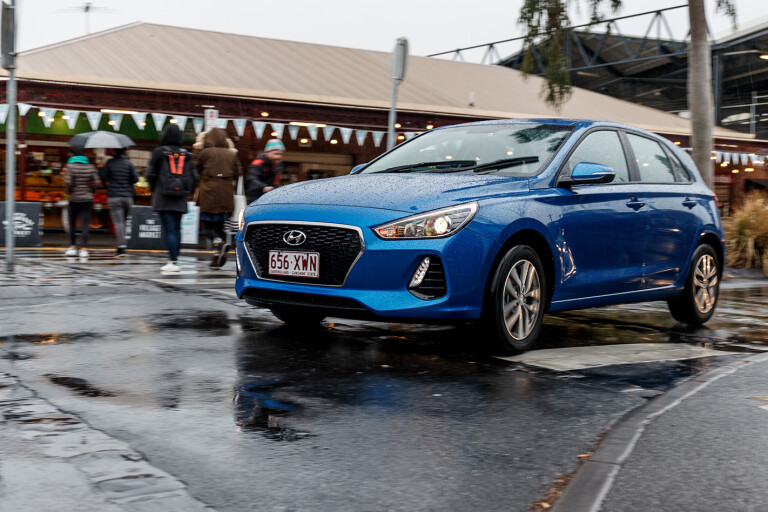
Active safety features including autonomous emergency braking aren’t included on the standard spec sheet, however it’s available as part of Hyundai’s SmartSense package that for around $1700, which takes the price up to $25,585.
The 2.0-litre engine’s claimed average fuel consumption is 7.4L/100km with the automatic, which is a little thirsty for a small hatch – the similarly powered Mazda 3, for example, sips unleaded at a rate of 5.8L/100km.
The i30 is covered by Hyundai’s five-year/unlimited kilometre warranty.
WHAT FEATURES DO THEY HAVE?
Ford Focus Trend
All fourth-generation Focus variants in Australia are powered by a three-cylinder 1.5-litre ‘EcoBoost’ turbo petrol engine coupled with an eight-speed automatic transmission.
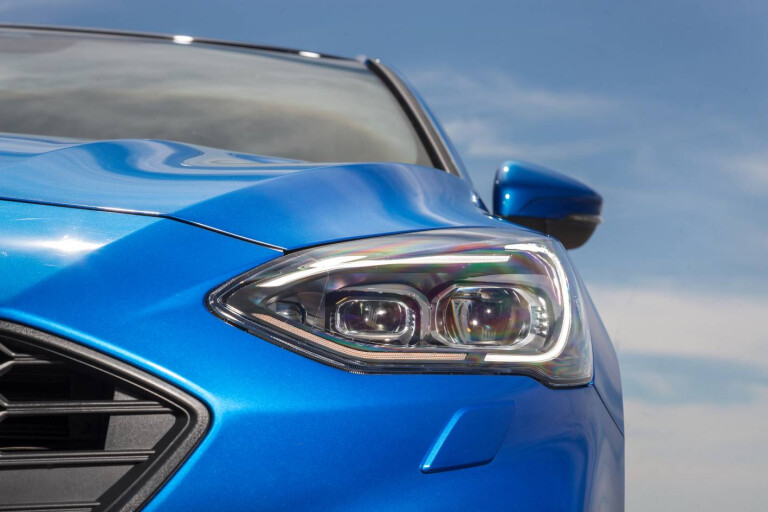
Autonomous emergency braking is standard across the range, as is an eight-inch touchscreen with 180-degree view parking camera, Ford’s Sync3 infotainment system with in-built-satellite navigation, digital radio and Apple CarPlay/Android Auto, phone charging pad, LED daytime running lights, and rain-sensing windscreen wipers.
The Trend rolls on 16-inch alloy wheels and has cloth seats with manual adjustment.
Hyundai i30 Active
You’ll find things in the i30 Active that are options in far more expensive cars, such Apple CarPlay and Android Auto smartphone pairing, satellite navigation and digital radio (DAB+), which are controlled via an 8.0-inch touchscreen.
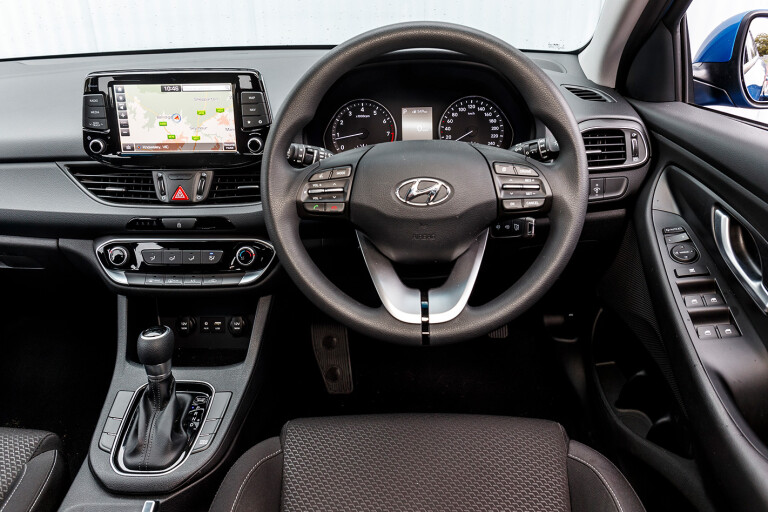
It also comes with LED daytime running lights, power-folding electric mirrors, cloth seats and cruise control. 16-inch alloy wheels are standard, and you get a full-sized spare alloy wheel as well – something that’s often a cost option in this segment, or replaced by a space-saver.
HOW PRACTICAL ARE THEY?
Ford Focus Trend
At 4.38 metres long, the fourth-generation Ford Focus is 18mm longer and has a 53mm lengthier wheelbase (2.70 metres), than its predecessor. This adds to interior space, but trim overhangs at each end give a more compact, svelte appearance.
This, and the fact it's 88kg lighter than the previous model, makes it feel impressively nimble, making it great for driving around town and parking in tight spots.
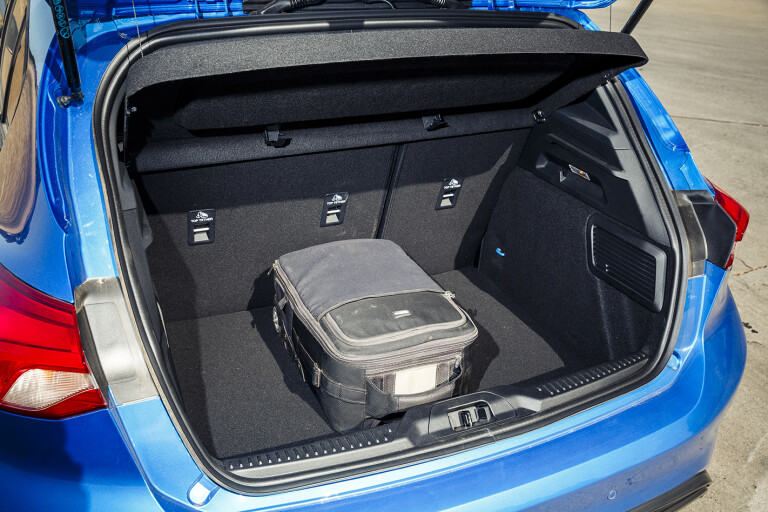
A more compact dashboard design adds an additional 100mm to the cabin and results in more rear legroom than before, even with the front seats pushed back to accommodate tall occupants.
The boot space measures 373 litres, which is about average for the small hatchback class.
Hyundai i30 Active
The Hyundai i30 is a five-door hatchback that seats up to five people.
It measures just 4.34m length with a 2650 wheelbase that accommodates a spacious interior and practical 395-litre boot space that expands to 1301 litres with the rear 60:40-split seatbacks folded down.
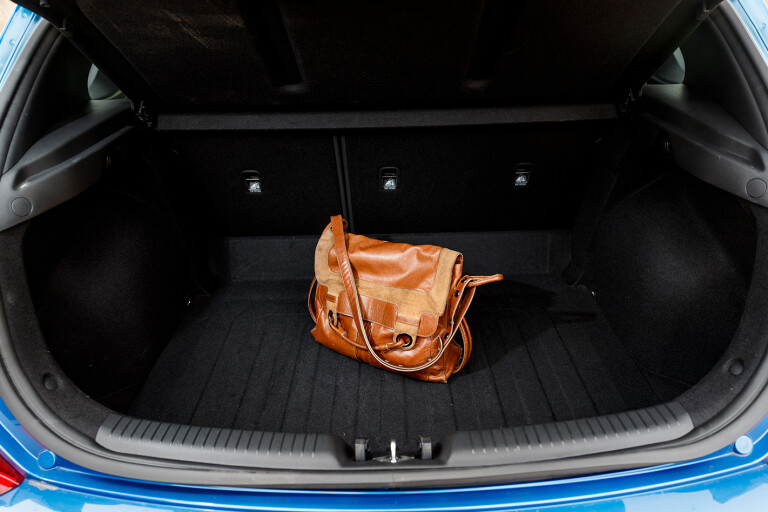
HOW SAFE ARE THEY?
Ford Focus Trend
The Focus Trend comes standard with autonomous emergency braking with pedestrian and cyclist detection, along with lane-keeping assist. It also has post-impact braking that applies the anchors after impact so the car doesn’t roll away.
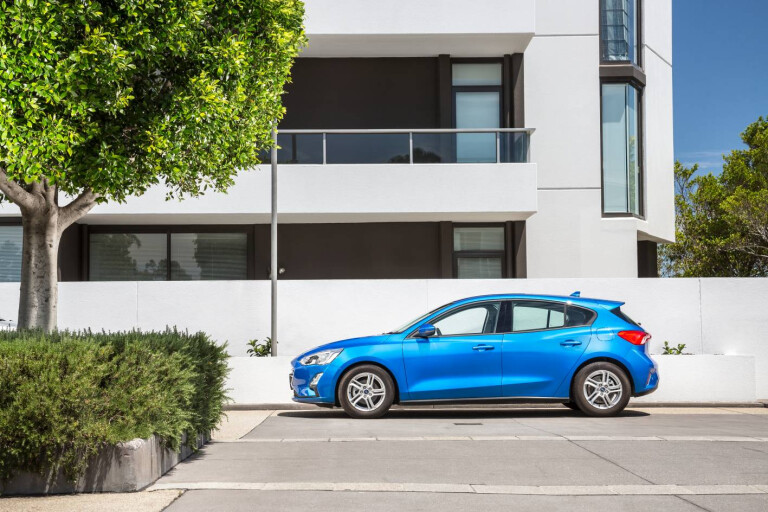
An extra $1250 brings a Driver Assistance pack that brings additional safety features such as rear-cross traffic alert, blind-spot monitoring, and adaptive cruise control with ‘Stop & Go’, which is great in traffic jams.
All Focus variants are equipped with six airbags, front and rear side curtains, and ISOFIX child seat anchors in the rear seats. Crash safety is good, with the 2019 Ford Focus range awarded a 5-Star ANCAP rating in December 2018.
Hyundai i30 Active
The Hyundai i30 was awarded a five-star ANCAP rating in April 2017. It’s a safe car in terms of crash protection, with seven airbags including a driver’s knee bag and full-length curtain airbags to protect your head.
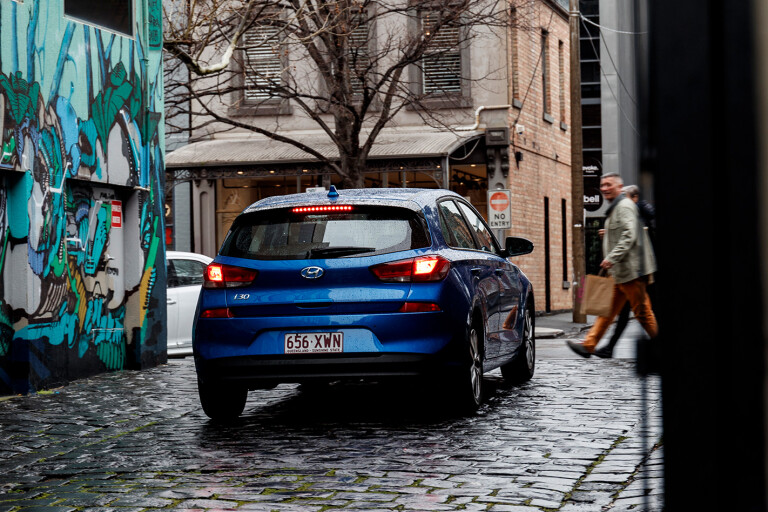
Other safety features include a reversing camera, rear parking sensors, auto-on headlights, LED daytime running lights, seatbelt reminders on front and rear seats, and electronic stability control that all cars are required to have.
Active safety features including autonomous emergency braking aren’t included on the standard spec sheet, however it available as part of Hyundai’s SmartSense package that for around $1700 adds active cruise control, auto-braking, lane keeping assist, driver attention alert, blind-spot detection, and rear-cross traffic alert.
HOW COMFORTABLE ARE THEY?
Ford Focus Trend
The Focus Trend’s roomy interior design is clutter free and intuitively designed, but doesn’t exactly boast much in the way of design flair.
The cloth front seats are pretty basic but are comfortable enough with good back support. The rear seats feel good too, but lack a centre armrest and their own air vents or USB sockets (though there is a 12v socket for device charging).
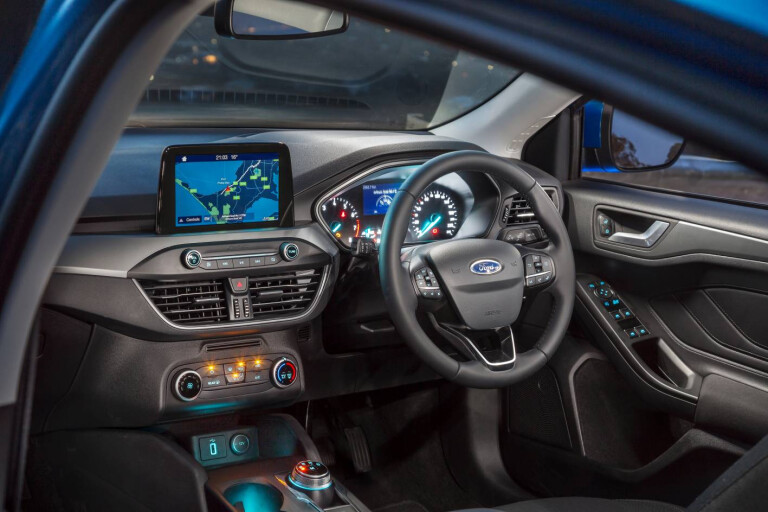
The dashboard design is a big improvement over the previous model, with the bulky central head unit replaced by a floating touchscreen that display’s Ford’s very user friendly Sync3 infotainment system. It’s a bit dull though, unless you like everything black, and the gauge cluster looks like it was borrowed from a truck.
On the plus side it’s very comfortable, with a smooth and quiet ride on the 16-inch wheels and conventional torsion beam suspension that rides over imperfections well.
Hyundai i30 Active
The i30 Active’s cloth seats are comfortable and there’s good leg and headroom throughout, though the rear seat is a little too narrow to comfortably seat three adults – though that’s common for this segment.
The smaller 16-inch wheels provide it with a better ride than the up-spec models that roll on 17s and 18s, and the locally-tuned suspension has a composed ride over bumps.
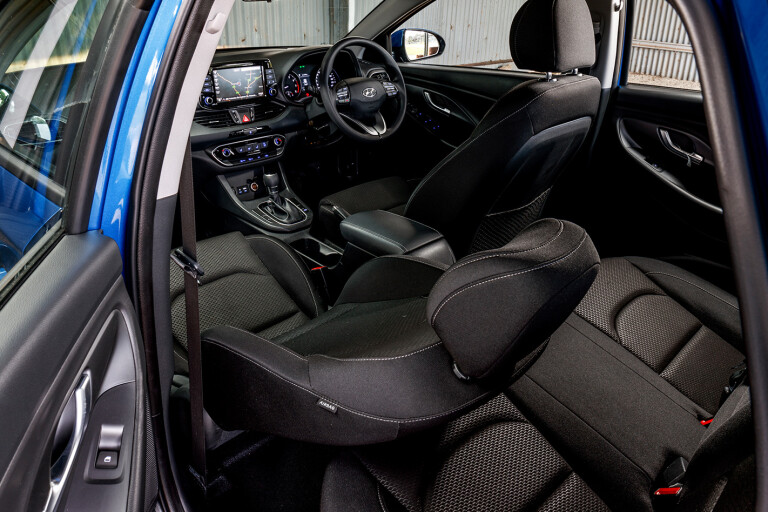
The conservative cabin design is a little bland and hard plastics abound, but the dashboard looks neat and uncluttered and the controls, particularly the switches on the steering wheel, are intuitively laid out.
The 8.0-inch touchscreen, which is a staple across the Hyundai and Kia range, looks good, works well and the infotainment system is very easy to navigate.
Rear-seat passengers miss out on their own air vents or USB/12v charging sockets, but if their phones go flat they can enjoy the view with good side and forward vision through the i30’s generous glasshouse.
WHAT ARE THEY LIKE TO DRIVE?
Ford Focus Trend
The 2019 Ford Focus’s spirited performance would be evident even during a short test drive.
Its 1.5-litre three-cylinder turbo is an enthusiastic engine and is rarely found wanting. There’s little by way of turbo-lag when you put the foot down and the eight-speed auto does a nice job shifting through the cogs, with Sport mode holding onto gears to deliver sprightlier performance.
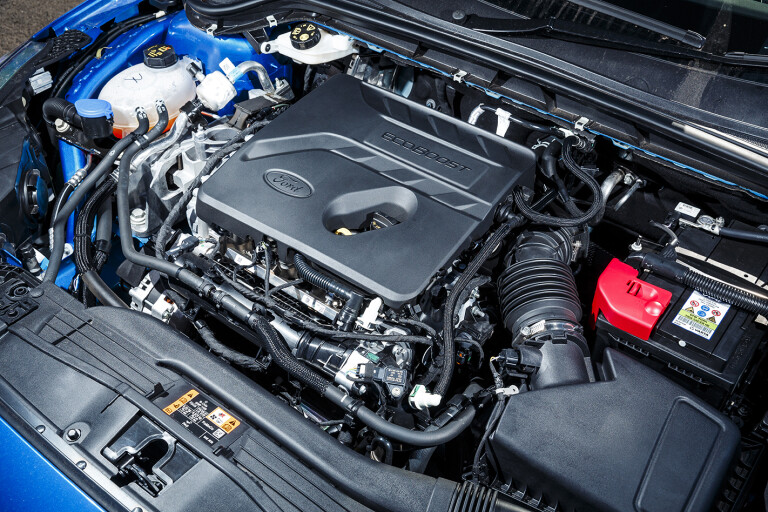
Fuel consumption is also helped by slippery aerodynamics, with the new design featuring underbody panels and an active grille shutter that have significantly reduced drag compared to the previous model.
The steering is light but crisp, so there’s good engagement between your hands and the front wheels, which combines with the well-balanced chassis to inspire confidence when pushing it into corners.
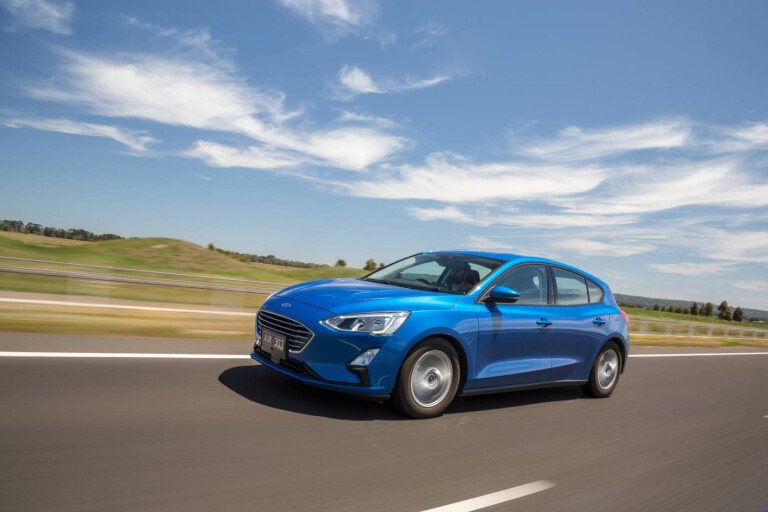
The ride feels controlled but comfortable around town or on the highway, which makes for an enjoyable ride whether it’s a quick trip to the shops or a weekend road trip.
Hyundai i30 Active
While it’s not intended to be as spirited or dynamic as the sportier i30 SR at the upper end of the range, the i30 Active certainly feels nimble enough around town. Hyundai has honed its chassis and suspension for Aussie roads resulting in a great ride and body control on a broad range of road surfaces, which makes it feel like a bigger, more mature car.

Meanwhile, the 120kW/203Nm 2.0-litre petrol engine responds quickly to throttle inputs and the six-speed torque converter automatic gearbox shuffles smoothly between steps. It may be a comparatively thirsty engine, but it also produces more power than many others at its price point. For those that don’t like to dawdle, that’s worth noting.
OUR OPINION
With the automatic transmission and optional Smartsense active safety, the Hyundai i30 Active is about $1000 cheaper than the Ford Focus Trend. However, not much else separates these two desirable hatchbacks.
They’re both conservatively styled, spacious, safe comfortable and well equipped, but we reckon the Focus has the edge in terms of driver enjoyment with its punchy three-cylinder engine, engaging steering and sharp handling.
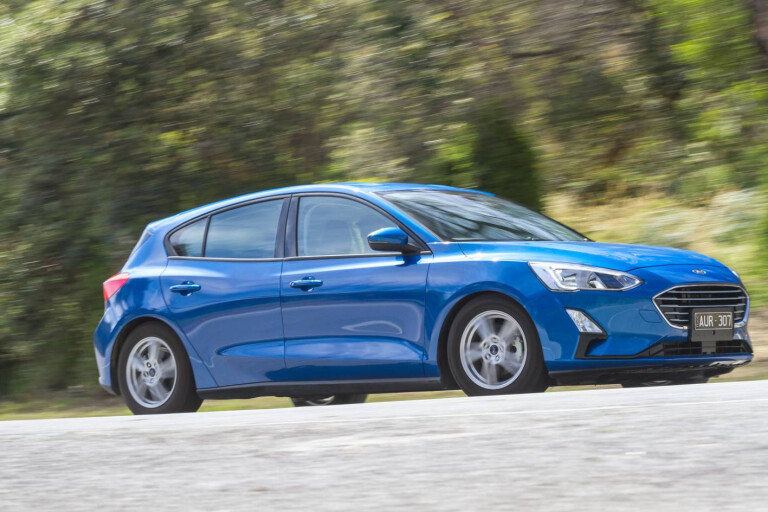
COMMENTS